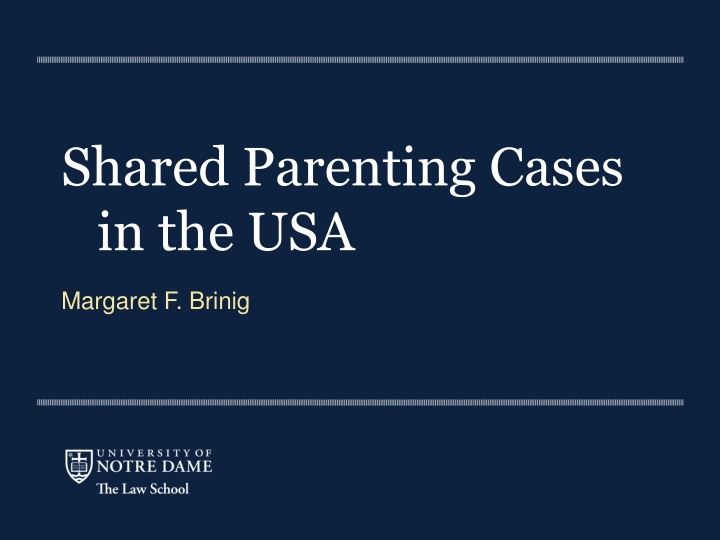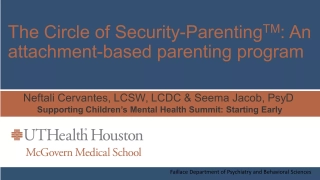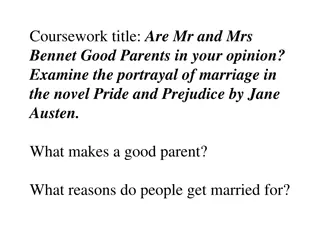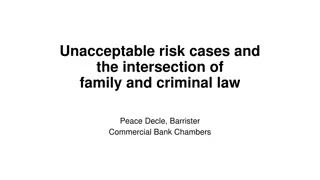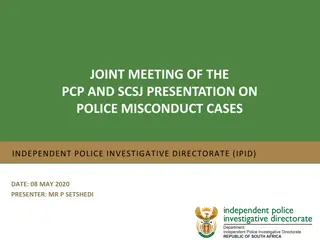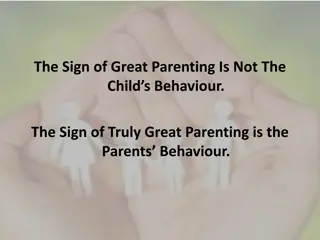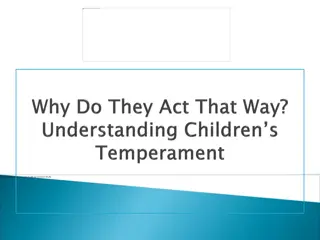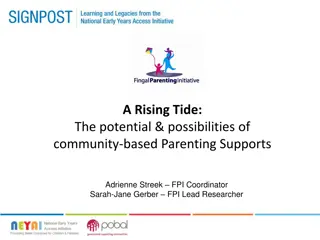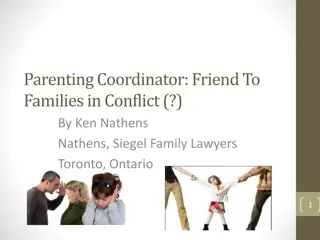Shared Parenting Cases in the USA
"The push for shared custody is growing in the USA as more couples with children separate. Legislation in countries like Australia and Scandinavia favors shared parenting. An empirical study in Arizona reflects a significant amount of shared custody cases, showing income-related differences and child support guideline impact. Explore the dynamics of shared parenting and custody arrangements in the US."
Download Presentation

Please find below an Image/Link to download the presentation.
The content on the website is provided AS IS for your information and personal use only. It may not be sold, licensed, or shared on other websites without obtaining consent from the author.If you encounter any issues during the download, it is possible that the publisher has removed the file from their server.
You are allowed to download the files provided on this website for personal or commercial use, subject to the condition that they are used lawfully. All files are the property of their respective owners.
The content on the website is provided AS IS for your information and personal use only. It may not be sold, licensed, or shared on other websites without obtaining consent from the author.
E N D
Presentation Transcript
Shared Parenting Cases in the USA Margaret F. Brinig
The Push for Shared Custody More and more couples with children are separating (unmarried or married) More and more mothers in the full-time labor force Active and growing fathers rights movement
Favored by legislation Australia Scandinavia Some US states Debated in other jurisdictions, including Brazil
What this paper adds Empirical look at Arizona, one of the US states with a very large amount of shared custody (and currently perhaps the strongest equal custody presumption). Note that some of these results may also be driven by the state s child support guideline system.
Method Cases from January, April, September (and some from May in Pima County) were randomly sampled, resulting in 620 from Maricopa (Phoenix) and 403 from Pima (Tucson), all filed in 2008. Documents filed in and by the courts were read through 2013 (up to 644 pages a case).
Preliminary Findings There was a large amount of shared or equal custody in both counties.
Large bumps at child support guideline thresholds 58 days = 8.5% deduction from amount otherwise due as percentage of total amount awarded based upon income share. 88 days = 16.1% deduction 173 days = 48.6% deduction
Very large income-related differences lowest mother s income quintile (poorest) 98.63 days median fourth quintile 100.855 days 3rdquintile 107.068 days 2ndquintile 121.143 days highest quintile 124.049 days For unmarried parents in support actions, the average is 77 days, and in custody actions, 102 days.
Income and Shared Parenting 140 120 100 Parenting Days 80 60 Mean Parenting Days 40 20 0 <$1198 $1,898.67 $2,583.33 $3,499 >$3500 5 4 3 2 1 Mom's monthly income (quintiles)
Some differences based on ethnicity In the Maricopa divorce sample, 14% of Hispanic/Latino parents had equal custody compared to nearly 20% for the non-Hispanic sample. Even for the non-equal parenting plans, the Hispanic numbers were far (and statistically significantly) lower: 95.53 days compared to 115.28 for non-Hispanics.
More post-order IPV with more overnights In a simple binomial regression, the more equal the parenting time (by the number of days of adjustment in child support), the more likely there was to be a protective order request, holding constant median household income in the census tract and whether or not the parties were represented.
No significant reduction in shared parenting for DV The mean number of parenting days in completed divorces involving protective orders or allegations of violence in complaint or answer was 110 days. For those without, the mean number was 111.18. In Pima county, more than 46% of the cases alleging DV and seeking protective orders had at least 1/3 of the parenting time for each parent (120 days or more) (and 28.2% had essentially equal custody).
Conclusions Not enough attention is being paid to the harm to children caused by parental conflict, especially domestic violence. If shared custody does benefit children, it is not being enjoyed by all Arizona children of divorcing parents those of modest means and those of unmarried parents are being further disadvantaged. Many of the results could be explained by the large child support reductions given to relatively wealthy fathers who share custody.
